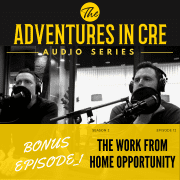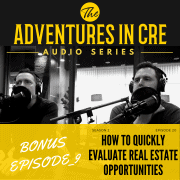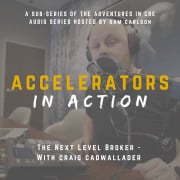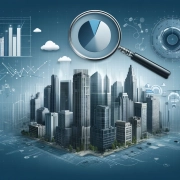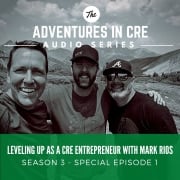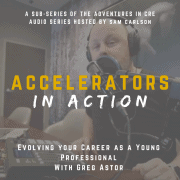Maximizing Your ROI on In-Person CRE Events
The world is opening back up, and that means that in-person events are getting going again. While this is an exciting development, many of us are rusty as it relates to our in-person networking skills. In this episode, watch as Spencer, Sam, and Michael discuss various strategies for how to maximize your ROI on in-person commercial real estate events.
Maximizing Your ROI on In-Person CRE Events
Or Listen to this Episode
You’re Invited! Join Us for a Vacation-Style CRE Networking Event in April 2022
As mentioned in this episode, we believe genuine professional connections are best developed through a combination of professional and personal experiences. In our careers, the most lasting connections – the ones that persist to this day – were forged by enjoying unique experiences together. To facilitate similar experiences for our A.CRE readers, we’d love for you and a guest to join us for a vacation-style CRE networking event for April 2022.
- Interested in learning more? If so, click here to receive more information in the coming weeks about this special event.
Resources from this Episode
Episode Transcript
Announcer (00:01):
Welcome to the adventures in CRE Audio Series. Join Michael Belasco and Spencer Burton as they pull back the curtain on everything commercial real estate and introduce you to some of the top minds in the industry. If you want to take your skills to the next level and be part of a growing community of CRE professionals across the world, this is for you.
Sam Carlson (00:23):
All righty, well we’re back. I mean it’s been a little bit of a lag between the last episode and this one but we’re really excited to be back. Hello and welcome back to the podcast you guys. It is officially a podcast.
Sam Carlson (00:36):
As soon as we can do another season, we will do that. But I’m joined by co-founders of The Adventures of CRE Website, Spencer Burton and Michael Belasco. How you guys doing?
Michael Belasco (00:46):
Very well.
Spencer Burton (00:48):
Good, Sam. Yeah.
Sam Carlson (00:48):
Well it’s good to be back. I mean it’s exciting because again, we’ve got some cool stuff we’re talking about today. There’s some changes happening, I think all around the country, all around the world. And we’re going to talk about how to maximize your ROI with in-person events.
Sam Carlson (01:04):
Now we haven’t been going to a lot of events, okay? But fingers crossed, that’s happening and that’s going to start happening more and more as we move forward. Now real estate, is a relationships business. Going to conferences, attending events, these are greats ways to not only make those relationships but make a big impact.
Sam Carlson (01:25):
So we’re going to unpack that today and we’ve got some cool stuff coming for you as well as far as potential announcements. I guess there’s a little stay ’til the end kind of deal. And you know to get us started, Spencer, talk to me about building relationships and then we’ll talk about events. Because again, I know people want to get together. We want to get together as the group here at A.CRE. But let’s talk about first the importance and impact of relationships in real estate.
Spencer Burton (01:53):
Yeah. Let me first tease the announcement a little bit.
Sam Carlson (01:56):
Ooh.
Spencer Burton (01:57):
We have been anxious to get back. We enjoy our virtual conversations and interactions with A.CRE readers, with our Accelerator members and graduates. But we thought, why don’t we find a way to get together in both a networking and a little bit of fun type setting. And so, we’re in the process of planning a … Call it a vacation-style CRE networking event for early 2022. And as that solidifies, we’re hoping that you might be willing to join us. Michael and I, Sam, and 100 of our closest A.CRE friends as we get together and see one another in-person.
Spencer Burton (02:41):
Now in terms of yeah, we’re May 2021 right now, for those listening. Many of us are vaccinated, more and more of the population’s becoming vaccinated. The economy’s opening back up. You see people at baseball games and outdoor events. I’m taking my daughter to New York City next weekend and the 19th shows are opening up. And so there’s a lot that’s happening and industry events now are beginning to restart. In-person industry events. And we’re all a little rusty. It’s been a year or so. And so this episode’s really talking about how do we maximize the investment that you make into that event? How do you get those most out of that day or two or three?
Spencer Burton (03:30):
And Michael, let’s start with you. As you think about the conferences that you’ve gone to, what are some things that you have done that you found successful that have maximized the value of that event?
Michael Belasco (03:43):
Yeah. Prepare before you go. Generally speaking, in a lot of ways. What I mean by that is if you can, figure out who’s going. You only have so much time there. Target people that you want to connect with that are important to you both up the ladder, down the ladder, however you want to categorize it but make sure you plan the time there as best as possible so that you’re meeting and connecting with people. Connecting with people prior. To shoot them a note say, “Hey, I noticed you’re going to this event. Would love to connect or catch up if it’s somebody you hadn’t met before.”
Michael Belasco (04:21):
The other piece I’d say in preparation is understand what the event is about. And come a little knowledgeable about it. That way, you know there’s things to talk about or stuff that maybe you’re learning something new. You’re going to an event because you want to learn something new. Come a little prepared and that way when you’re having small talk or chatting, you’ll be a little bit knowledgeable and you’ll be able to A, be better prepared with better questions and it helps you in conversation. So preparation’s important.
Michael Belasco (04:46):
And then while you’re prepared, the next piece is to go and just kind of throw yourself out there and get out of your comfort zone. I find the best conversations are struck up when you sit down at a table and there’s that sort of awkward interaction and you’re both feeling that awkwardness and then you break through it. But having the common ground there is what the conference is about. So maybe there’s a specific event that you went to within the larger conference and there’s some relation there.
Michael Belasco (05:13):
So being knowledgeable about who’s there and what the topics are, two important things. And then just letting the time you’re there be a little more improvised or create space for that but also have some time prepared to meet with people and connect prior to going there. So those would be my major takeaways. And I’ve great events, I’ve had bad events and this is the ones that are more successful I tend to [crosstalk 00:05:36] –
Sam Carlson (05:35):
You’re pretty good at the event thing, though. In groups of people, you really do shine. It’s funny because I feel like in my close circles, I’m very extroverted. But in big circles, I’m a little bit more recluse. Which I find kind of duplicitous. It’s a little strange for me. But you shine there. Like you really … You come alive in those situations. Is there any … Like did you take any kind of etiquette or any kind of training?
Michael Belasco (06:06):
No.
Michael Belasco (06:09):
Yeah. I would say from a perspective, I don’t put myself above or below anybody in those larger circles. I feel like everyone’s feeling the same awkwardness and weirdness. And that’s even in private settings. Like whether I’m meeting top industry people or people who are just starting out and looking for advice, my intention is to always be an equal no matter what.
Michael Belasco (06:33):
So sometimes it’s a little intimidating upward but in a larger group I feel like everyone’s feeling that awkwardness of a larger group. So I feel the comradery of that so that kind of breaks me out of that shell. There’s no preparation for that. That’s sort of how I feel in those situations so it helps –
Spencer Burton (06:50):
Yeah, it’s interesting you say that. So I’ve noticed that about Michael. You get in a networking settings. What that means is a room of people mingling and you have maybe a program in one hand and a drink in the other and you’re kind of looking around like where do I go? Michael has this, at least in my experience, he’s very natural at just going up to groups, introducing himself and get started. I struggle with that.
Spencer Burton (07:17):
And so here’s a technique that I use. For those listening that find it hard to get it going. Before I even get to the event, I’ve researched who’s going, and then I actually send them emails. And I say, hey, I noticed that you’re going to be at this event. I’m looking forward to connecting with you there. And it’s almost … and this is probably just a confidence boost for me, they then no that at some point, I will come up and say hello to them. And therefore, when I see them in the room, it is a friendly face. And oftentimes, I’ve never met them in person, but because there have been some interaction, it’s much easier for me to go up and say, hey, it’s great to see you. Nice to connect. And then a conversation ensues. And so that’s a little … I don’t know if that’s a crutch or a technique, Sam –
Sam Carlson (08:10):
Both. That’s a communication technique. It’s called seeding the jar, you know? It’s basically … A lot of times in these big settings, everybody is … We all have these dynamics in big group settings. And some of us, like myself, I’m a little bit more reclusive, when you’re making a presentation and there’s this group full of people and you say, do this action. Like raise your hand or do whatever it is. It’s the first person that is the hardest one. As soon as that first person throws their hand up, all of a sudden, everybody else is participating, right? And so what you’ll do a lot of times is seed the jar. Or in other words, put something there, like put a plant there, so the initial action isn’t so hard. Isn’t so full of friction. That’s a really good tactic.
Sam Carlson (08:59):
I think the most important skill, okay? Getting deals, finding new opportunities. These are all secondary consequences of being able to do something very proficient and effective up front. And one of the things that I’ve learned in my career and my life, is the most important skill you have are the communication skills. All right? And just as a general framework when you’re meeting new people, when you’re creating a dialogue, if you’re approaching a person or if you’re starting a new conversation, the best way to build rapport and to really get that person to ally with you, is to talk about them. Make the conversation about the other person as much as you can. That book, How To Win Friends And Influence Others.
Sam Carlson (09:53):
Yeah. That book, I’ve said this several times, that book can be summed up with one phrase, allow and help people talk about themselves and they will like you. Okay? This is in our DNA, okay?
Sam Carlson (10:07):
So I think the first thing, if I were to give just a tactic, I will give you two. One would be engineer your conversations in a way to where you’re forming a conversation that’s about them. You’re interested. You ask questions that start with how and why and what. Because this will help them really pull out of … Because sometimes it’s hard for people to talk about themselves. But if you’re asking them questions about how do you do this? What did you do when? Then they’ll start really digging deep and opening up. So that’s a really good way to approach that.
Sam Carlson (10:37):
The second thing is, when you approach people and you’re having a dialogue, there will come a time to where you can start talking about yourself. You need to be prepared for this, like Michael was talking about, Spencer was talking about. You need to be prepared. And the best way to do this is to have your version of a story prepared. People love stories. Not a boring story. A story that is I’m here, that connects you to the event. Okay? Like Spencer was talking about. We have a really incredible event that we’re looking at doing with a small group of people. And we have reasons for doing that. And we’ll share those reasons with that small group of people when it’s time to do that. But that one thing by itself, the story, why we’re doing it, why we want to create this tight-knit group of people is something that everybody will relate to and they’ll immediately become curious about.
Sam Carlson (11:37):
So when it’s time for you to talk, don’t speak in platitudes. You’ve now developed a conversation. You’ve really deep-dived this person and gained a genuine interest in them, too. Like this shouldn’t be just a tactic. This is a framework to learn and build trust, mutual trust. But when it’s your turn, don’t be boring. And stories are not boring. So come with a pre-engineered story that you think about. And then that way when you kick off your side, it just shoots you into another level of conversation and communication.
Spencer Burton (12:14):
Yeah, that’s interesting. So I want to dig a bit more into the relationship building element of real estate. First off, it’s incredibly important. One of the most valuable aspects of you, either to an employer or to an investor, is the depth, breadth, and quality of your network.
Spencer Burton (12:32):
We can meet people over the phone or on Zoom calls, but nothing replaces the in-person experience. And building deep and lasting and valuable relationships is generally an iterative process. Or maybe it starts with an email and progresses to a phone call. But at some point, if you really are going to have a relationship with someone that you can add value to them and they can add value to you, you need to get together and have some genuine time together. Maybe having some fun. Maybe learning together. Speaking multiple times and those sorts of interactions build bonds that truly last.
Spencer Burton (13:17):
Michael, your experience in that? Did you disagree with me in any way?
Michael Belasco (13:21):
I 100% agree. It’s like anything. You can have a superficial … You can meet at an event and have that conversation and then go on with your own thing. The true lasting relationships are the natural ones where you go through experiences together. Whether they’re fun, whether they’re trying, whether they’re educational, whatever that is. But that creates a bond. You guys have a mutual shared experience and having those and creating those is what link people together for longer than, hey we met at an event and had a five minute conversation. Which are great as starters. But yeah, you need to have that continued experience. And again, if you’re in a multi-day event or something like that, that is the opportunity to create that rapport.
Michael Belasco (13:57):
But it’s not just, hey, we connected and had a conversation, there’s that. You can keep that going and have this sort of superficial relationship and those are great, by the way. There’s a lot of those that are just … It’s just how it is. Those are how those happen and they continue. Maybe you meet somebody virtually and they live in Texas and you live in Pennsylvania and you’ll never get together but the times you do, those are when the relationships go deep. So I –
Sam Carlson (14:23):
I’m having this idea kind of on the fly. And I know a lot of people do this. I know I’ve done this. You’ll go to an event and you’ll find your comfort zone. You’ll find the one or two people that … Those are maybe the first two people you have conversations with and you stick with them through the whole event.
Spencer Burton (14:38):
Yeah.
Sam Carlson (14:39):
Right? And it’s hard. Because I think those people are almost doing the same thing. They’re using you as a comfort blanket and so you end up maybe getting one or two contacts but the whole idea of this thing is to make a massive impact. And I like, I really like in fact, I hadn’t thought of that before, Spencer, but I’m going to use it. What you talked about is really going in with a plan and saying, hey, I want to outreach to … Whether that’s six, twelve, whatever the number was, these people. I want to plan that and make a plan. Because if I reach out to them before the event and then I don’t reach out to them and actually do that, oh, that’s probably really bad.
Spencer Burton (15:21):
Right.
Sam Carlson (15:21):
They’re expecting now that level. But I think that is, not only is it a good way to plan to do that, but you don’t want to walk away from an event having only met one or two people. Because hey, these guys or gals were a lot of fun and so we just stuck together the whole weekend. No. We want to have as many dynamic interactions as possible. And then that will get us, again, scale and opportunity down the road.
Spencer Burton (15:50):
Dynamic and organic interactions. So my technique is, it seeds it. I love the seeding the jar.
Sam Carlson (16:03):
The jar.
Spencer Burton (16:03):
I love that. And that’s the first step. But then you need multiple organic opportunities to connect with those individuals. And by the way, the event that we’re crafting for early 2022, is meant to see organic interactions and not the faux interactions where you’re sitting at the same table because you’re at the same breakout session and you have those skin-deep conversations with those people and then that’s the end of it, you never see one another. It’s like you need opportunities to have more organic, genuine conversations. Michael, I’m sorry I interrupted you.
Michael Belasco (16:38):
No, it was perfect. I was going to add, at these events, if these are couple hours long and you have to get back to your day, whatever it is, create about an hour plus. If they’re evening events, try to leave that time open afterwards. If they’re afternoon events, try to leave a couple hours open. Because after the events are done, a lot of times is where you get really strong opportunities to network. They’re outside of the event, they’re outside of the curation of the whole process and then it’s like, hey, do you have some extra time? Let’s go grab lunch. Let’s go do something. Let’s go have a drink.
Michael Belasco (17:10):
And when I look back to all the successful events, that space was available afterwards to then have that experience. So if you’re at an event, make sure there’s time afterwards. Or if you can, that’s usually one of the best opportunities I’ve found.
Michael Belasco (17:26):
To the other side of the coin, like we’re talking about the awkward … Everybody’s walking in feeling awkward and uncomfortable, right? Everybody does. And what do you do? These questions that you ask which really don’t matter, it’s just breaking the ice. There’s the other side of the coin, I’ve gotten this a lot. And this was like a request to the large group when you’re in these crop circles and somebody comes in. And they’re not exactly sure how to enter and they’re having these awkward entrances, right? I think one of the goals for everybody in those circles is to let that person come in and make them feel accepted. Because a lot of time, it’s happened to me many times in my career going up to a circle just trying to get in. And there’s this awkward response and you just kind of fade out into the back. Everybody’s experienced it and it’s not a good feeling.
Michael Belasco (18:13):
So be cognizant of that. If you’re that person in that group that recognizes there’s this awkwardness of this other person and you reach out to that person, that creates an opportunity for you as well. So never be the one to amplify the awkward situation. Embrace that person and bring them in and that turns into some powerful connections there, too, so another piece.
Sam Carlson (18:35):
Be the hero. Be the hero.
Michael Belasco (18:37):
Yeah, yeah.
Sam Carlson (18:37):
New opportunities that you can lift other people up. First of all, it’s a good and a moral thing to do regardless. But man it positions you as a really great person to be around and who doesn’t want to do business with a great person?
Sam Carlson (18:53):
Let’s talk real quickly, we’ll give a little bit more context about what we have coming up and then we’ll conclude this episode. Because we jammed this thing full of really good, actionable, ideas here. But one of the things, as Spencer talked about, we’ve talked about the potential that comes from these relationships. We’ve talked about some of the impediments of why people may not get out of an event or out of a conference what they intended on doing. And in that light, we wanted to come up with a way that was very dynamic that put people in situations that were both casual and fun, that put them in a position to learn really high-level things and to meet and discuss with high-level people.
Sam Carlson (19:40):
And this is what all of our discussions … I mean we really have deconstructed this idea and I’m so excited because I think we can’t announce it yet, but when we ultimately announce what we’re going to be doing in 2022, this is the proposed time frame. Early 2022, I should say. I think that it is going to potentially change the way that this is done, on a micro-level. I mean we’re not talking a conference with 2000 people, okay? This is a different thing. But I think it’s going to be, again, instead of a mile wide and an inch deep, I think we’re going to be an inch wide and a mile deep as to the level of impact that we’re trying to do with this. Anything you’d add to that, Michael or Spencer?
Spencer Burton (20:25):
Yeah. The thing I would add is there’s more than ample opportunities to go to conferences and spend your time sitting at a table learning. And what I’ve found, and this is to Michael’s point earlier, the relationships I build during the eight hours that I’m sitting at a table listening to speakers, and those are interesting things. But look, I can get those on Zoom webinars. I can read those in articles.
Spencer Burton (20:58):
The reason I go to in-person is I want the interactions because then i can build genuine relationships. Those sorts of events aren’t tailored in a way that allowed me to build those kind of relationships. and so to Michael’s point, yeah, what do you have to do? You have to then set up, okay, let’s go out and grab dinner after this. Or hey, do you have a few minutes? Maybe we’ll grab some lunch in between sessions. And you have to create your own organic experience.
Spencer Burton (21:24):
Well our thought is, let’s all get together. Let’s go on vacation together is really what we’re saying. Let’s go on vacation together. And have some learning, there’s some learning components to that. And then let’s have some fun. And some of this together and some of it’s apart but you’re in a more of an organic setting.
Spencer Burton (21:44):
Also, from our standpoint, we’re constantly meeting A.CRE readers, Accelerator members, everyday. Really incredible people. Let’s bring us together in a way where each other can meet one another in more organic and valuable and deeper ways.
Spencer Burton (21:58):
So we’re thinking early 2022. Right now it’s looking April but we’re not ready to give dates. We will include in the description of this video or this podcast. If you’re on website, it’ll be included at forum. But a link where you can express interest in joining with us in early 2022 for this vacation-like event. Add your name to … It’s not even a wait list. It’s a list of interest. So as we begin to prepare, we can let you know more details as they become available. Anything Michael that you’d add to that?
Michael Belasco (22:32):
No, I think that’s well-said.
Sam Carlson (22:34):
Awesome. Well this has been fun. I mean we’re going to be doing, just so you know, to the listeners, we really, again, as you know, if you’ve listened to this podcast for any length of time, we did traditionally do these in seasons. And so piecing together podcasts episodes has been a challenge but we’ve now committed to get back out there and start creating more and more episodes. We do intend on creating some seasons coming up, but you can expect more episodes coming from the group here. And we will see you on the next episode.

